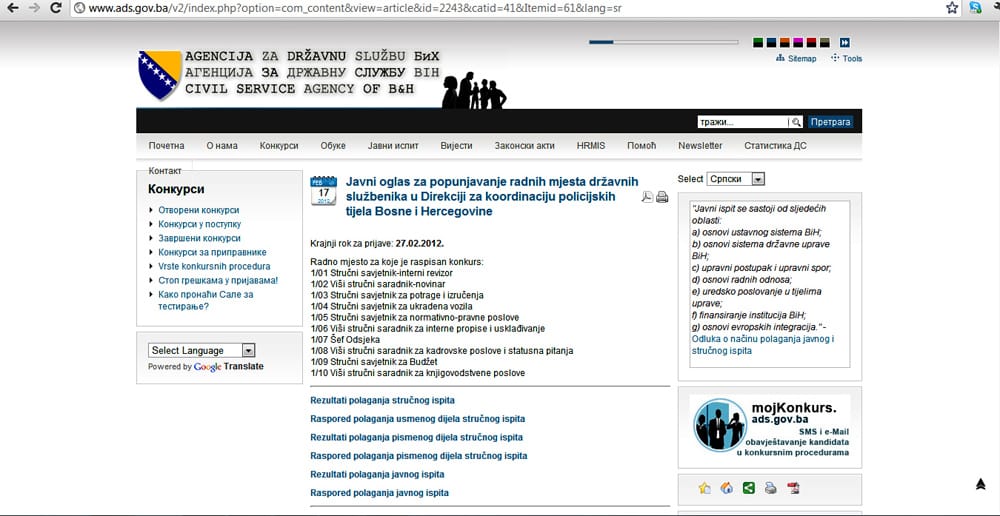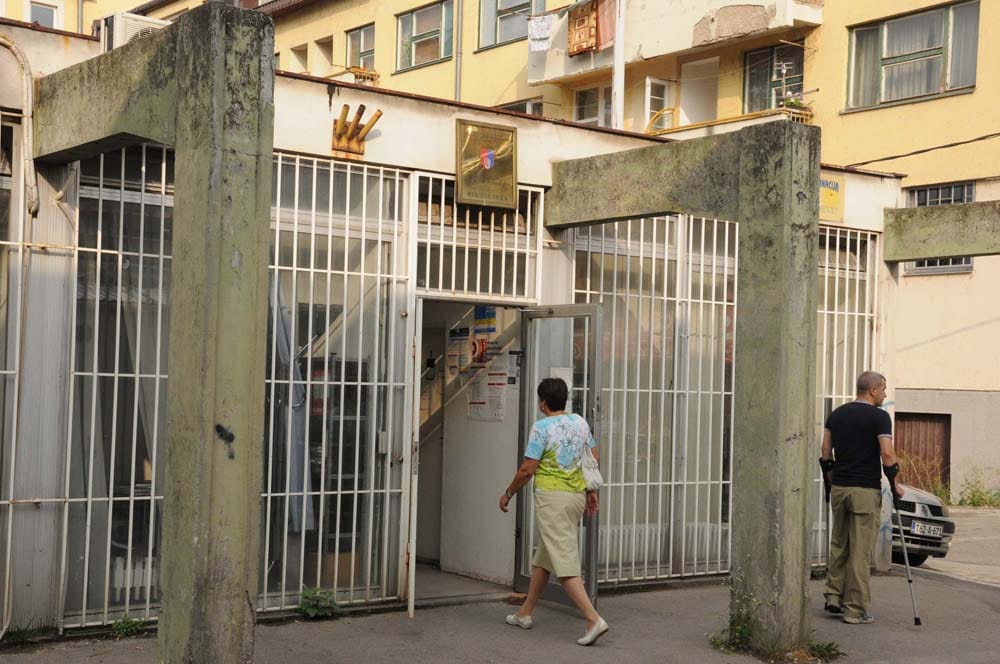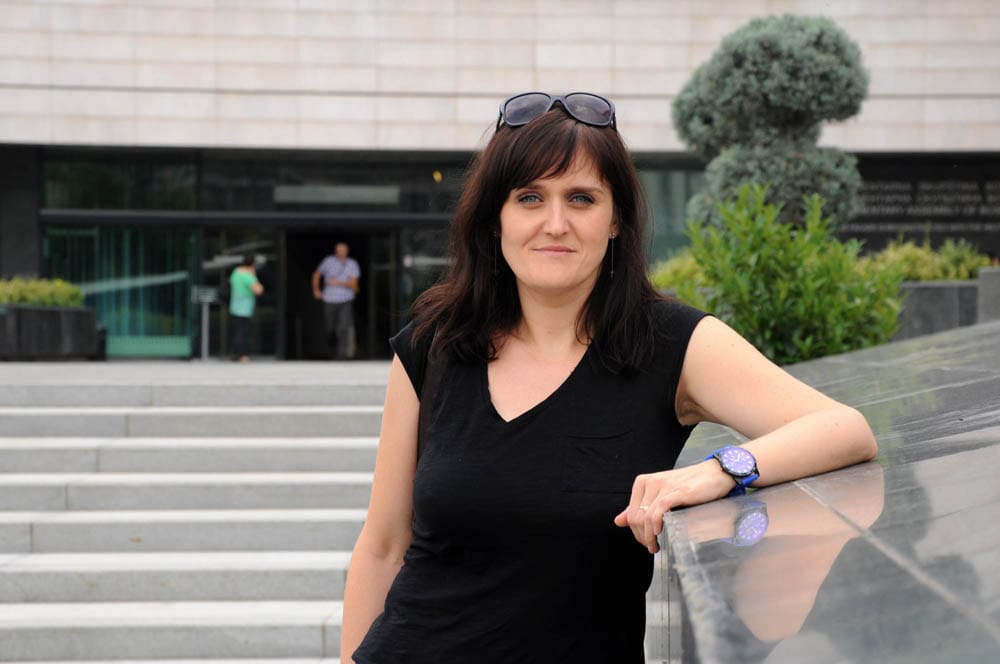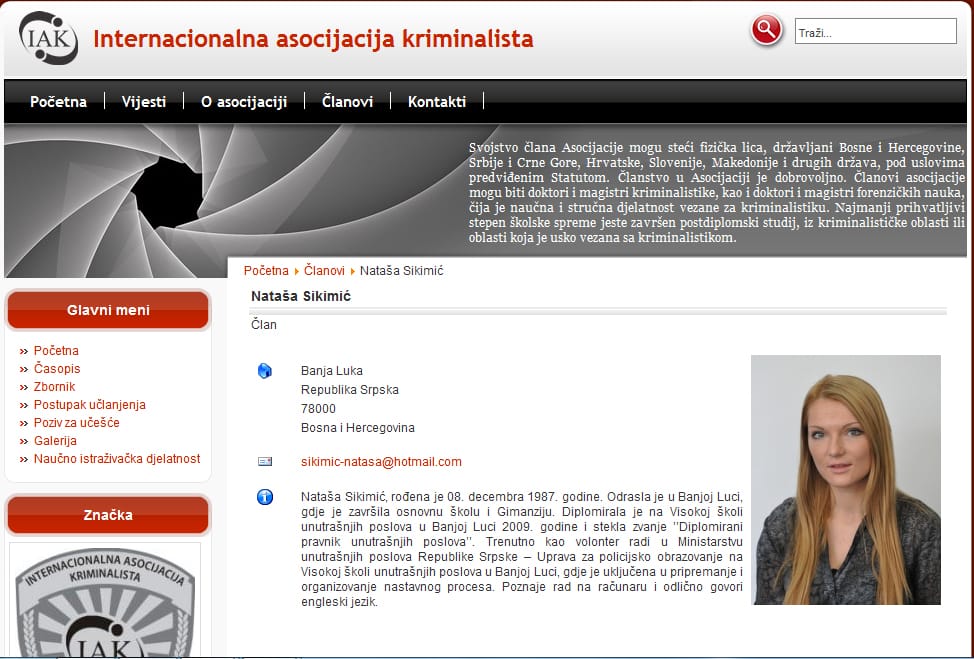The only question in our minds was which one of the three of us would get the job.
Earlier this year, three reporters for the Center for Investigative Reporting in Sarajevo (CIN) applied for a civil service job as «journalist» with the Bureau for Coordination of Police Agencies in BiH. The ad for this post called for a university degree, knowledge of English and two years experience in the same or similar job.
How could one of us not get this, we figured, since we all had advanced degrees, fluent English and a average of 10 years experience as journalists.
Don't want to miss our stories?
Sign up for our newsletter.
Don't want to miss our stories?
Sign up for our newsletter.
As it turned out, the job went to a woman who had no journalism degree or experience, but who had volunteered with police agencies for two years and studied with the deputy director of the Bureau. She got a perfect score on a test given to finalists for the job.

Photo by CIN
You might say we were vain to think we were better qualified than the winning candidate, but research by CIN has found that our experience trying to get a government job is common in Bosnia-Herzegovina (BiH). Ads may spell out qualifications and requirements that filter out all but the best candidates — but the person already connected frequently wins the job regardless..
Based on records collected from 33 state agencies — and it took a court fight to get the agencies to show these to the public – CIN has found that over the past five years, at least 260 people have been hired following a call for applications to positions they had already worked at either as freelancers or short-term contractors.
Government hiring in BiH, as many know, is too often a waste of taxpayers’ money and of people’s time. Biased hiring opens the way to nepotism and cheating and sours public faith in fair government. The only beneficiaries, aside from the “new” hires, are members of the selection committees who can get up to 300 KM each for screening candidates doomed never to be hired.
The Promise of Good Jobs
Civil service jobs represent a regular salary, good working conditions, stability and a guaranteed pension. For many citizens who”ve gone through two decades of political uncertainty and a faltering economy, including more than a half million unemployed now, the state represents the best possible employer.

So when such a position is advertised, hundreds of applications can come in. The competition though may be phony – a ruse to hide the fact that the position is already taken, or that the real range of possible candidates is “restricted”. The best way to secure a civil service job is not to answer ads at all — but to secure a short-term service contract with a state agency, which doesn’t require organizing an official selection process.
Human resource experts agree that a person already working in a certain position before officially applying to it has advantages compared to anyone coming from outside.
Fuad Kasumović, a deputy minister of finance, goes a step further and says that this candidate seems likely to him to already know the questions when they talk into the exams.
But even if you pretty much know ahead of time who is going to get the job, hiring is expensive. CIN has found that between 2006 and 2011, the government spent tens of thousands paying selection committees and buying ads in newspapers.
How CIN Found Out About State Hiring
CIN mailed a request for information to 54 state-level institutions asking for the names of civil servants and the type of contract that they”d held in that same period between 2006 to 2011.
The aim was to get insight into the type of contract and the date when made, and how many vacancies advertised were for positions in which people were already under contract.

Photo by CIN
Some agencies refused to disclose this information saying it would violate the privacy of employees. CIN launched a lawsuit against the Agency for Civil Service (ADS) and won. The state court agreed that the public has a right to know who works for the government and under what conditions.
Even so, only 33 of the institutions then turned over responses or at least partial responses to CIN. They were interesting.
For example, in the Police Support Agency seven out of 17 full-time employees had already worked at those positions before calls for applications were put out.
Agency Director Rahmija Hodžić told CIN that these people were working on a freelance basis – then were hired after ADS put out an official call for applications. He said he did no meddling in the process. “ It went through ADS.” There was nothing illegal about the procedure, he said.
Also of interest are examples from the BiH Department of Civil Aviation, the regulatory body that oversees civilian air travel and traffic control.
The Department had 54 full-time employees, and 17 of them had already worked in offices for which they were later hired. The freelance agreements and short-term contracts that CIN reporters looked into said that those persons were hired until the call for applications were to be put out.
Auditors found that the agency concluded short-term contracts with 17 persons (11 with university degrees and six with high school degree). It cannot be determined from documentation the agencies made available whether the jobs were advertised and in what way the employees were selected.
State auditors have said that when it comes to hiring, the agencies should stick to current regulations which dictate hiring procedures and should respect the principles of transparency and accountability.

Photo by CIN
A similar situation exists in the Return Fund, whose mission includes financing the return of war-era refugees to Bosnia. Of 11 employees, four already worked in the same positions before the ad was even put out.
There are 123 full-time employees in the Secretariat of the BiH Parliamentary Assembly. Thirty-two worked in those positions on freelance contracts before any call for applications was put out.
At the Ministry of Justice one third of the currently employed were already working in positions that were then advertised and given to them in the period between 2006 and 2011.
This percentage at the Ministry of Civil Affairs of BiH amounted to about 20 percent and at the Ministry of Security in BiH 40 percent of employees hired for advertised civil service jobs, already were doing them.
The situation is also interesting in the Legislative Office of the Council of Ministers. The office makes sure that all materials sent to the Council are legally sound and in line with the BiH Constitution and state laws. It has had six staffers since 2007 and five worked there before any call for applications.
The Monetary Cost of a Subverted Civil Service
The Civil Service Agency would not answer CIN”s questions about how much the state paid to publish notices of vacancies for positions that are not really open. But responses from individual agencies which CIN asked for information about employees who have high school and grade school educations give an idea.
The Department for Civil Aviation of BiH paid around 3,500 KM for two vacancies in 2009 which were already filled. In 2010. more than 200 candidates submitted applications for positions as a janitor, cleaning lady, driver and clerk at the Police Support Agency. There were already people doing these jobs at the time of the call. The agency spent 1,500 KM to reimburse all the members of a hiring commission and another 2,000 KM to publish an ad.

Photo by CIN
On average, publishing an ad and paying fees to a hiring commission cost the state around 2,000 KM per position. Hiring commission fees are based on how many candidates must be screened for jobs and members can get up to 300 KM if there are more than 30 candidates for a position.
The Social Cost of Unfair Hiring
Enver Išerić, a former director of the FBIH ADS, said there is no legal basis for hiring civil servants through freelance contracts. They should be used, he said, for temporary or unexpected jobs not the part of an organizational plan, things such as whitewashing office space.
Kasumović, the deputy minister of finances, warns of the danger of irregularities in recruitment for civil service. He said that it is often known who will get a job and that these people usually get shot-term contracts first, then they are hired after a pro forma vacancy notice has been put out. How an agency’s manager decides whom he or she is going to hire as a freelancer is a matter of personal preference.
“Absolutely a matter of personal preference, of nepotism and party lines,” said Kasumović.

Photo by CIN
Rudo Vidovic now the BiH Deputy Minister of Transport and Communications, served as the minister in the last term. One of his aides was the son of Slavica Josipovic, his party colleague and neighbor.
Vidović said that he chose his aide based on professional qualifications, not because of neighborhood or party connections. It doesn’t matter. A minister has a right to choose whatever aides he wants. Whether that gives them an advantage later in finding civil service jobs that are supposedly based on merit is another question and the line between connections and qualifieation can seem blurred in BiH.
For example, Dejan Majkić, the son of Dušanka Majkić, an SNSD party executive and Member of Parliament, was hired as a deputy director of the Tax Office of the Republika Srpska in 2011 by government decision. Ognjen, Majkić ‘s other son is an apprentice at the Tax Office .
Somenka Ljubić works for the communication regulatory agency while her father Bozo was Minister for Transport and Communication.
Daniko Petrović is an advisor to his father-in-law, Neboojša Radmanović a member of the state Presidency.
Kasumović believes that connections and political fitness are the main advantages in getting a government position. His opinion is that of candidates who receive civil service jobs, just one or two out of 100 could be so lucky to get a job without anyone”s intervention.
Asked why no one has done something to stop such practices, Kasumovć said , “Who is going to react? The one doing the hiring? He’s not out of his mind. He likes to have leeway so that he can non-transparently…sometimes someone will ask him, either from the party or his family to hire him.”
Erol Mujanović, an expert in human resources working for a UNDP program on a project offering trainings to young people to look for work, previously worked as a director of a company which profiled the best candidates for employers.
In his opinion, if the candidates who already work at the job at the time when a vacancy is put out are indeed the best ones, than there is no big issue, and the government should be fair and should not waste the other candidates’ time and money. However, if they are not the best, than this is a huge issue.
“And if the candidates are incompetent, this is disastrous for an organization in the medium and long run, with such a recruitment policy and such management of human resources we are in for the Greek syndrome, sooner or later,” he said, referring to unrest and protest by unemployed and disillusioned youths in that country.
One Example of a Candidate Who Didn”t Get the Job

Photo by CIN
Adisa Okerić-Zaid, a translator with 10 years of experience with international organizations in BiH, the ICTY and the financial sector, has given up even trying for a state position. She has tried repeatedly for translator positions only to be rated second best to candidates with connections and short-term contracts with state agencies.
“The first reaction, when this starts, is some insecurity This is later followed by more frustrations. Finally I gave up a year ago.”
State ADS Director Neven Akšamija , however, sees no problem with how civil service recruitment is working in Bosnia.
“I think that the three civil service agencies that exist in BiH have fulfilled their mission.”
CIN Reporters Don”t Get the Job
In February, three CIN reporters submitted applications for a journalist position with the Bureau For the Coordination of Police Bodies .

Photo by CIN
Three months after the ad appeared, one of the CIN reporters was rejected because she did not pass a general exam.
The other two applicants took an additional test for the position that consisted of questions about the laws that regulate the bureau”s work and the Law on Freedom of Information. They scored eight out of 10 questions then were invited to take an oral exam that consisted of simple questions such as “Are you nervous?” “What is an interview?” “What are newsboys?” And “What is a press clipping?”
In the end the job went to Nataša Sikimić who graduated from the Banja Luka Police Academy in 2009, and was a volunteer for the Academy and for the Association of Criminologists, but never worked for media. She said has applied unsuccessfully before for jobs with state police agencies before.. She is the co-author of a paper with UroŠ Pena, deputy director of the bureau and a former student of his.
Sikimić told CIN that she prepared for two months for the test she scored perfectly on. But, talking to a CIN reporter, she did not know the correct title of the Law on Free Access to Information, which is where most of the questions at the test came from. And asked if Pena had helped her prepare, she said: “This conversation is over.”







